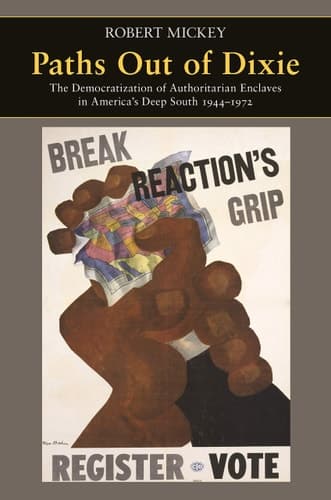
Paths Out of Dixie: The Democratization of Authoritarian Enclaves in America's Deep South, 1944-1972 (Princeton Studies in American Politics: ... and Comparative Perspectives, 147)
by Robert Mickey
Published 2015 by Princeton University Press
584 pages
About this book:
The transformation of the American South--from authoritarian to democratic rule--is the most important political development since World War II. It has re-sorted voters into parties, remapped presidential elections, and helped polarize Congress. Most important, it is the final step in America's democratization. Paths Out of Dixie illuminates this sea change by analyzing the democratization experiences of Georgia, Mississippi, and South Carolina.
Robert Mickey argues that Southern states, from the 1890s until the early 1970s, constituted pockets of authoritarian rule trapped within and sustained by a federal democracy. These enclaves--devoted to cheap agricultural labor and white supremacy--were established by conservative Democrats to protect their careers and clients. From the abolition of the whites-only Democratic primary in 1944 until the national party reforms of the early 1970s, enclaves were battered and destroyed by a series of democratization pressures from inside and outside their borders. Drawing on archival research, Mickey traces how Deep South rulers--dissimilar in their internal conflict and political institutions--varied in their responses to these challenges. Ultimately, enclaves differed in their degree of violence, incorporation of African Americans, and reconciliation of Democrats with the national party. These diverse paths generated political and economic legacies that continue to reverberate today.
Focusing on enclave rulers, their governance challenges, and the monumental achievements of their adversaries, Paths Out of Dixie shows how the struggles of the recent past have reshaped the South and, in so doing, America's political development.
Robert Mickey argues that Southern states, from the 1890s until the early 1970s, constituted pockets of authoritarian rule trapped within and sustained by a federal democracy. These enclaves--devoted to cheap agricultural labor and white supremacy--were established by conservative Democrats to protect their careers and clients. From the abolition of the whites-only Democratic primary in 1944 until the national party reforms of the early 1970s, enclaves were battered and destroyed by a series of democratization pressures from inside and outside their borders. Drawing on archival research, Mickey traces how Deep South rulers--dissimilar in their internal conflict and political institutions--varied in their responses to these challenges. Ultimately, enclaves differed in their degree of violence, incorporation of African Americans, and reconciliation of Democrats with the national party. These diverse paths generated political and economic legacies that continue to reverberate today.
Focusing on enclave rulers, their governance challenges, and the monumental achievements of their adversaries, Paths Out of Dixie shows how the struggles of the recent past have reshaped the South and, in so doing, America's political development.
Recommended in:
- There’s Been a Massive Change in Where American Policy Gets Made (Dec 6, 2022) with Jake Grumbach
Recommended with:

Dynamic Democracy: Public Opinion, Elections, and Policymaking in the American States (Chicago Studies in American Politics)
Devin Caughey, Christopher Warshaw

State Capture: How Conservative Activists, Big Businesses, and Wealthy Donors Reshaped the American Statesâand the Nation
Alexander Hertel-Fernandez

Fragmented Democracy
Jamila Michener

Private Government: How Employers Rule Our Lives (and Why We Don't Talk about It) (The University Center for Human Values Series, 44)
Elizabeth Anderson

Dilla Time
Dan Charnas